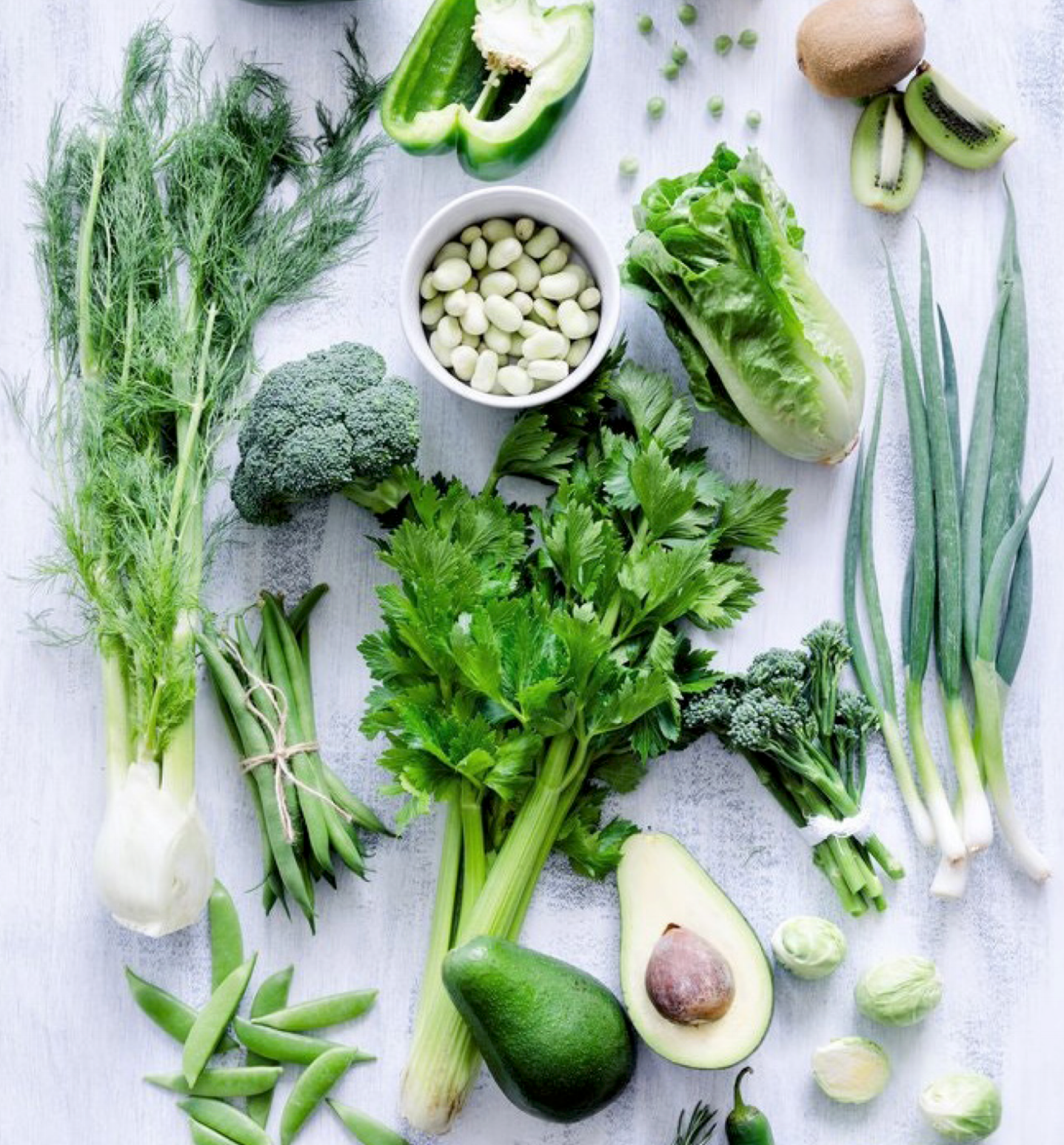A health-focused perspective on the plant-based diet
Téana Graziani FEATURES EDITOR
Photo: Martin Poole.
Eating healthy is something that we all try to do. The reason why so many people fail at maintaining a healthy diet, aside from the potential expense and lifestyle change, is because they do not fully understand what a “healthy” diet consists of. To be fair, that isn’t completely our fault. With so much dietary research taking place over many decades, there have been numerous and sometimes conflicting claims as to what we should be eating to achieve optimal health for ourselves, causing lots of mixed messages and confusion.
Although veganism is becoming a more well-known topic in popular culture, many people are still unaware of what it is. Being a vegan means that one does not consume or otherwise purchase any product that is derived from animals, mainly pertaining to meat, eggs, and dairy. There are many negative stereotypes and misconceptions that are associated with being vegan. However, it has been found that eating a plant-based diet is one of the best things that you can do for yourself and for your health.
Since 2014, there has been a 600% increase in the number of vegans in America. According to 2017 statistics, 6% of the United States and 1% of the world identifies as vegan. So why are so many people making the switch to a plant-based diet?
Lower Levels of Total Cholesterol
Cholesterol levels play a large part in heart health. Having high cholesterol levels increases your risk for coronary heart disease by blocking the arteries that lead to the heart, increasing risk for a heart attack. It has been found that plant-based diets are associated with significantly lower levels of total cholesterol. This is because plant cholesterol, or phytosterol, is toxic to human cells, so our intestines do not absorb it when we consume vegetables. On the other hand, all animal products — but red meat in particular, including processed meats such as cold cuts and hot dogs — contain high levels of saturated and trans fats, as well as cholesterol itself. This animal cholesterol can be absorbed by the human body, and promotes high cholesterol levels in the body.
High blood pressure, also known as hypertension, can be caused by high cholesterol levels. It contributes largely to health problems such as heart failure, stroke, and kidney disease. This is because the arteries become narrowed from a build-up of fat, cholesterol, and other substances which together are referred to as plaque. As arteries harden with plaque, blood clots become more likely to form. When the artery becomes blocked, the necessary oxygen cannot reach the heart, causing a heart attack. Worldwide, it is estimated that one billion people are affected by hypertension, and that approximately 80 million Americans aged 20 and older are hypertensive. The common method of therapy recommended for dealing with high blood pressure is regular exercise to promote weight loss, and therefore less stress on the body’s internal system. Recent studies have shown however, that a plant-based diet alone is more effective in promoting weight loss, and as a result lowering blood pressure, than the combined effort of exercise and an omnivorous diet. This is because the plaque blocking the arteries consists of animal by-products such as saturated and trans fats as well as cholesterol. All derive from animal-based products, whereas plant-based products have none.
Veganism and a Low BMI
Obesity and weight gain are sometimes associated with Type 2 diabetes, metabolic syndrome, hypertension, and cardiovascular disease. Data from the Adventist Health Study has shown that the Body Mass Index (BMI) increases as the amount of animal products in one’s diet increases, and found that vegans have the lowest BMI even compared to vegetarians and pescetarians (those who eat fish alongside a vegetarian-based diet). Findings from the European Prospective Investigation into Cancer and Nutrition (EPIC Oxford) study have also shown that vegans gain significantly less weight as they age, compared to omnivores. The EPIC-PANACEA study, which is an offshoot of the EPIC Oxford study, found a positive correlation between total meat consumption and weight gain, even after adjusting for energy intake; an increase of 250 grams a day of meat led to a 2-kilogram weight gain after five years in both men and women.
Lower Risk of Developing Diabetes
Since 2000, studies show that one out of every three children born will develop diabetes. It has been discovered that diabetes is largely preventable, even reversible, with lifestyle changes: namely by adopting a plant-based diet. Animal fat consumption in individuals has been found to be positively associated with diabetes prevalence. Studies show that those who eat meat one or more days a week had significantly higher rates of diabetes, and that the more frequently meat was eaten, the more frequent the disease. Even between those of the same weight, people who ate a plant-based diet had but a fraction of the diabetes rates, and no instances of diabetes were found in any of the vegan participants. According to Neal Barnard, M.D., this is because the fats found in animals and dairy products block cells’ insulin receptors, preventing glucose from entering those cells. This results in high blood sugar levels, and therefore diabetes.
Fewer Cancer-Promoting Agents
Everyone either knows someone who has cancer, or someone who has had it. T. Colin Campbell, Ph.D., a professor at Cornell University and the author of The China Study, discovered the correlation between cancer and diet. He found that cancer develops over a long period of time, through three stages. The first stage is “Initiation,” which is when chemicals or other agents attack the genes of normal cells to produce genetically modified cells capable of eventually causing cancer. The body generally repairs most of such damage, but if the cell reproduces itself before it is repaired, its new daughter cell retains this genetic mutation. The second stage is “Promotion,” which is when the affected cells continue to replicate themselves and grow into cell masses, or tumours. This is a long growth phase that occurs over months or years, and is now known to be reversible. The final stage is “Progression” which occurs when the growing cancer masses break away from the tissue of origin, travelling to other tissues where they can grow independently, spreading the cancer as a result.
Campbell has also discovered that, although cancer and other diseases begin with genes, genetics are not the only arbiter of whether cancer appears in a person. He says that normal genes are converted into cancer genes by certain high-reactive chemicals, also referred to as carcinogens or things that both initiate and promote cancer growth in humans. Campbell found that cancer cells would only grow if they were fed by these carcinogens. Some of the worst and most common carcinogens that we know of are tobacco, red meat, processed meat, and UV radiation. One that many are unaware of, however, is called casein. Casein is the main protein present in dairy, and it is used in many processed foods. It has been found to be the most significant cancer promoter ever discovered. Not only that: casein also has been found to increase cholesterol and to enhance the formation of fatty deposits in the arteries, causing cardiovascular disease. Animal-based proteins have the same effect on the body as casein does, rendering the same results.
We cannot do very much about the initiation of cancer cells in ourselves; it is outside of our control. However, there is a lot that we can do to help prevent the promotion of the disease and letting it further develop by changing our exposure to promoting agents, therefore reversing the cancer process in us. Plant protein is safer to eat and does not promote cancer as it does not have this biological casein in its makeup. It has no effect on cancer promotion in the body, and converting to a plant-based diet can significantly lower your risk of the disease.

Misconceptions
There are many misconceptions about the vegan diet that are simply false. These are some of the most common myths and misunderstandings about veganism.
Protein? Iron? From Where?
It is a common misconception that people who do not eat meat are protein deficient. Although protein is certainly an important nutrient which plays a key role in the functioning of our bodies, we do not need huge quantities of it. The Reference Daily Intake (RDA) recommends that we consume 0.36 grams of protein for every pound that we weigh. The average person eating an omnivore diet eats doubles the amount of protein that they need daily. This isn’t good;consuming too much protein can be bad for your health. There are no health advantages from eating more protein than recommended for your weight, and diets that are high in protein can even increase the risk of osteoporosis and kidney disease.
So where do people consuming a plant-based diet get their protein from? The most common sources are beans, nuts including nut-based milks, seeds, grains like quinoa, soy products, and many vegetables such as peas and leafy greens.
The thing about plant-based protein is that it is easier for your body to digest than the animal-based alternative. Meat contains 0% dietary fibre, which can be very hard on your digestive system and bowels. Fibre is essential because it maintains these processes. Not getting enough of it can cause heart disease, diabetes, weight gain, and especially colon cancer, which is the third most common cancer to date. Many people who follow the standard omnivore diet are not getting enough fibre in their diets. Dietary fibre comes from plant foods — mainly from plant cell walls. 25 grams is the recommended daily intake of fibre for an adult. High fibre foods also play a beneficial role in appetite control, keeping you from being hungry throughout the day. It also absorbs excess fats in the body. It has been found that fibre-rich foods generally have low glycemic loads, and thus have a preventative role and essential role in the management of blood glucose in diabetes.
And what about iron? Iron can be found in many of the same sources as protein. The recommended iron intake for adult men is a maximum of 20 milligrams a day, and for women, a maximum of 18 milligrams. This can easily be reached by eating plant-based foods. Similar to protein, the problem is that most omnivorous people are eating too much iron as a result of their meat intake. An excess of iron can result in the development of Alzheimer’s. When excess iron accumulates in the brain it destroys myelin, which is a fatty tissue that coats nerve fibres. Since a study in 2015, scientists have been able to predict if and when a person will get Alzheimer’s disease based on the amount of iron present in their brain.
Something that vegans and others on plant-based diets may occasionally miss out on is vitamin B12, which is found predominantly in animal products and fortified foods. B12 promotes the formation of DNA and helps produce healthy blood cells and maintaining good nerve function. The recommended daily intake of B12 for people over the age of 19 is 2.4 milligrams a day. Breakfast cereal in particular is a good meatless source of B12, as well as many plant-based milks such as soy and almond milk, but if someone is struggling to reach the recommended daily intake, supplements are available and sufficient.
![Fort York Community Garden (Toronto Community Garden Network [TCGN]).](http://138.197.175.238/wp-content/uploads/2018/02/takenfromFortYorkCommunityNetworkGarden.png)
Soy and Estrogen: Healthy or Unhealthy?
Another common misconception held by many people is that soy beans and products that come from them are unhealthy. There is a belief that eating soy can affect the hormone levels in the body, causing breast cancer in women, and lowering sperm count in men. This is believed because, like all legumes, soy contains plant compounds called isoflavones (a.k.a. phytoestrogen). In soy beans, these compounds are highly concentrated. The chemical structure of these isoflavones weakly resembles that of estrogen, and can mimic the effects of the hormone. In theory, it is possible that any health issues that are related to hormones could be affected by these substances found in soy, giving rise to the belief that soy can lead to such health issues. However, recent studies have shown that although the action of the isoflavones is similar, it is not identical to human estrogen.This makes a big difference in the way human tissue responds to the hormone.
In terms of breast cancer, breast tissue holds numerous receptors that interact with various forms of estrogen, and it is the alpha receptors that are most likely to be bound with cancerous cells. Oestadiol, which is the human form of the hormone, links to both the alpha and beta receptors whereas isoflavones, or the plant version, bind only to the beta receptors that can, in turn, reduce the activity of the cancer stimulating alpha receptors. This was discovered in a recent study which debunked the belief that soy is unsafe to eat, and suggests that it might even be helpful in preventing breast cancer in women.
As for soy’s effect on men, most studies that have been done on soy intake in men either demonstrate no effect at all, or only minor effects that likely depend on an individual’s genetics. It was found that regardless of soy intake, neither soy protein nor isoflavones affected the reproductive hormone concentrations in men regardless of age or cancer status, suggesting that the consumption of soy foods would not result in the adverse effects associated with lower testosterone levels.
What does contain a lot of estrogen, however, is milk produced by animals. Cows are like humans; they must be pregnant to produce milk. When pregnant, the estrogen levels in the blood and milk in both a cow and a human woman increase by nearly 20 times. The estrogen in animal milk affects the body differently than plant-based phytoestrogens do, and has the potential to cause undesired effects. In a 2002 study done by Ganmaa Davaasambuu, a physician and scientist at the Harvard School of Public Health, after examining 42 countries, she and her colleagues found that countries with the highest consumption of dairy products had the highest rates of prostatic and testicular cancer. A similar study she conducted in 2005 showed the same results for breast, ovarian, and uterine cancers in women. Davaasambuu found that drinking large quantities of cow’s milk can significantly increase estrogen levels, and this estrogen may have the potential to increase a man’s risk of prostate cancer and reduce fertility. She is currently conducting a further study to verify her assumptions.
Another study that was done on the effects of dairy on human estrogen levels was completed in 2010 and was done on men, women, and children. All of those tested drank two 8-ounce glasses of organic filtered milk per day for 21 days. The results of the study concluded that the adult male participants had significantly increased levels of estrogen and progesterone as well as a sharp decline in testosterone. The rest of the participants also had increased estrogen and progesterone levels. According to the researchers, the levels of hormones could be problematic for children by delaying sexual maturation for males, and increasing it in females. In addition, adults could hypothetically see an increased risk of hormone-sensitive cancers such as breast and prostate cancer. They did confirm however, that dairy intake had a direct effect on hormone related issues such as acne and pre-menstrual syndrome in the adult participants.
Positive Takeaways
The vegan diet has its fair share of health benefits, and is definitely worth the try if you are able. Everyone should eat a varied diet according to their preferences and restrictions. Start being mindful about your nutrition as early as you can — it’s easier to maintain optimal health throughout your life than it is to treat it in older age!




